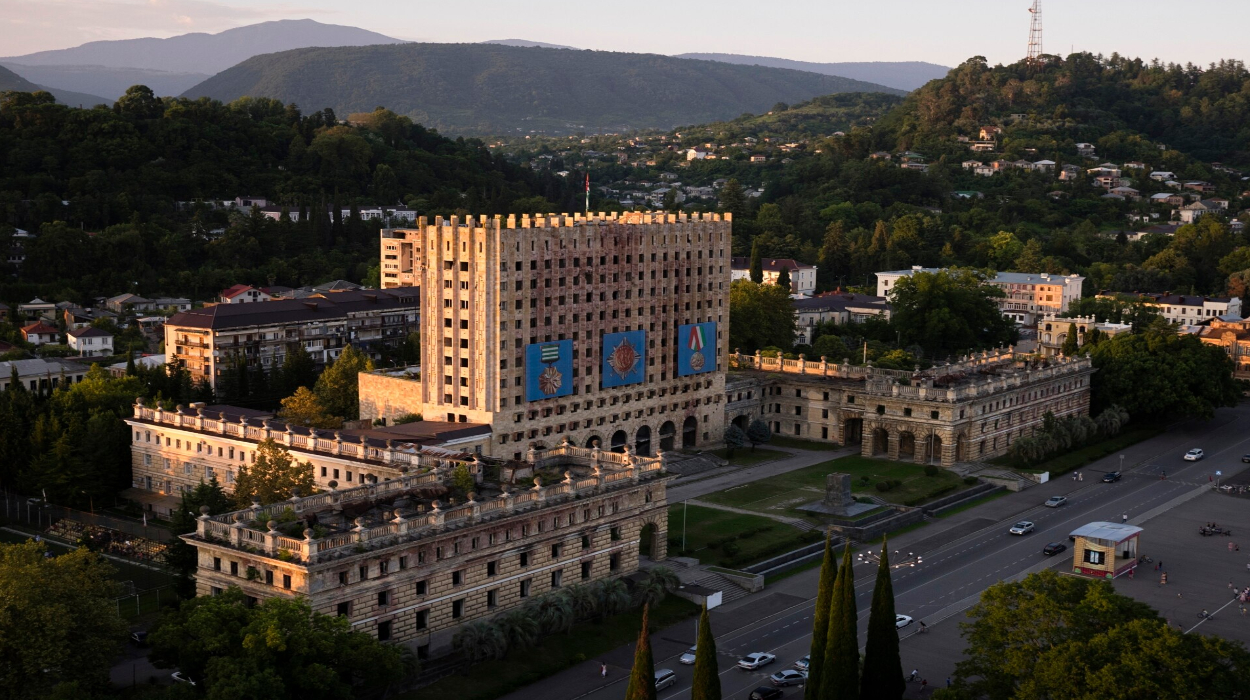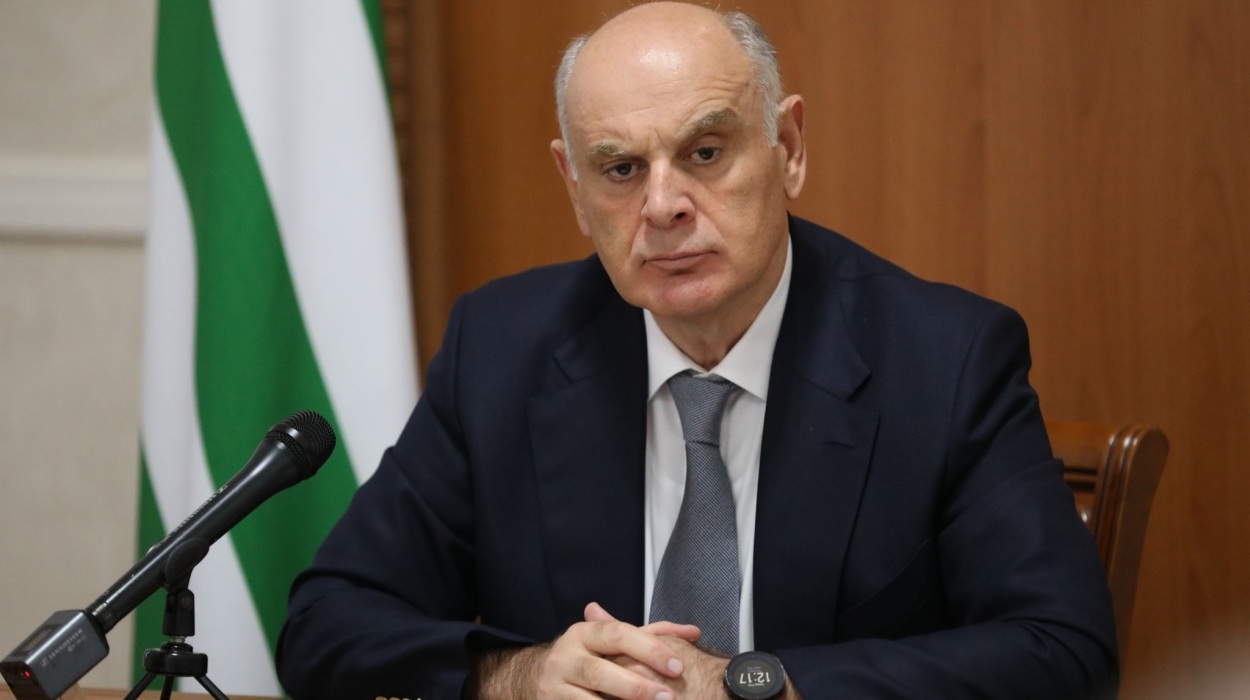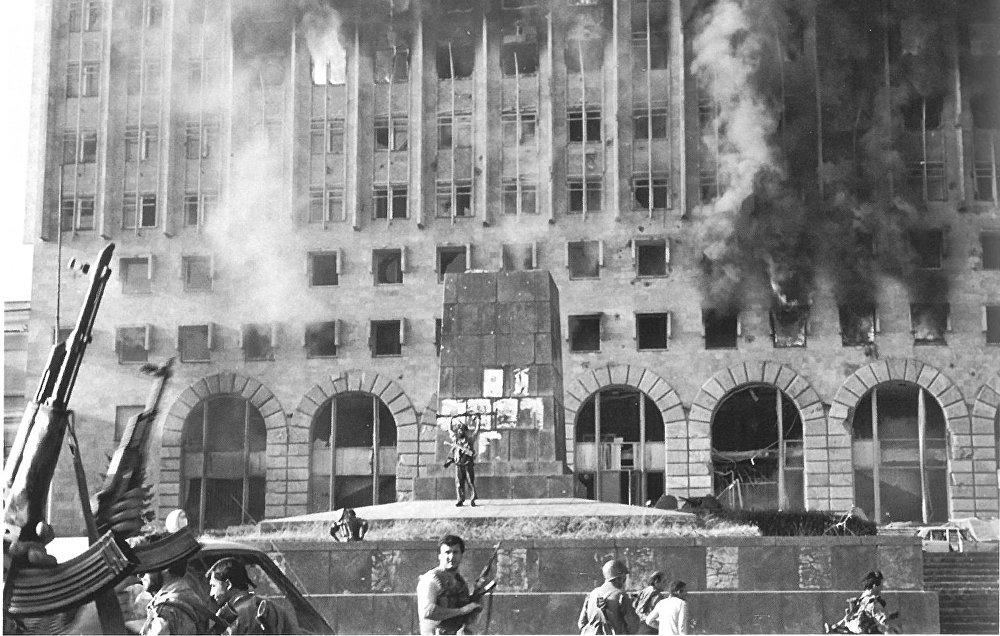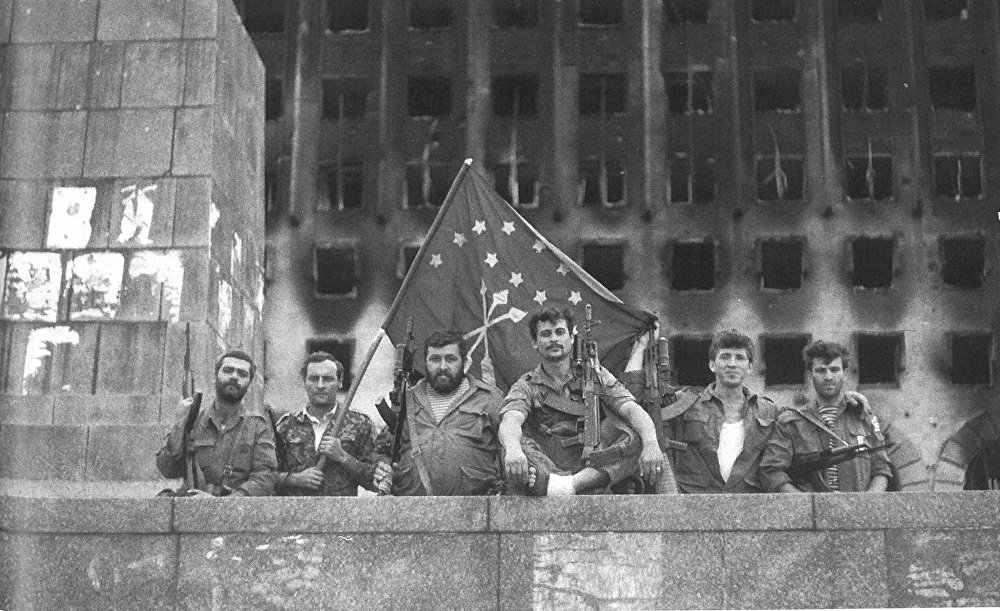Presidential-Hotel Proposed for Former Abkhazian Council of Ministers' Site?

The Council of Ministers building heavily damaged during the 1992–1993 Georgian-Abkhazian War.
Ekho Kavkaza | Vitaly Sharia — A video clip circulating in the Abkhazian social media community captured a meeting between the President of Abkhazia, Aslan Bzhania, and Abkhazian students in Moscow. The content sparked a whirlwind of negative reactions and perplexity online, with criticisms coming not just from the established critics of the government.
During the gathering, the conversation pivoted to the 12-story building that housed the Council of Ministers in Sukhum, which was consumed by fire during the Abkhazian forces' takeover in the climactic stages of the Georgian-Abkhazian war of 1992-93. This event coincidentally occurred just a week prior to the similarly tragic assault on Moscow’s so-called White House, which also resulted in a fire following a confrontation between the president and the parliament. While Moscow's structure was promptly renovated, assessments of the Sukhum building in the ‘90s deemed it irreparable due to the extent of the fire damage. However, a change in perspective occurred during Raul Khajimba's presidency when Moscow specialists expressed the possibility of a restoration. Yet, just last year, the "Ekho Kavkaza" relayed that Russian scientists, in collaboration with the Abkhazian Academy of Sciences, evaluated the building's structural integrity, revealing it retained 76% of its initial capacity, deeming anything below 50% as critical. Consequently, with the building's declining stability, it appears increasingly logical to either replace it or transform the site into a park. But it wasn't this topic that ignited the public's fervour. In the words of Aslan Bzhania:

Aslan Bzhania
“Investors have shown interest in reviving the Government House. We have commissioned an expert evaluation, which will soon determine the building’s future — be it a renovation, preservation, or demolition. Once we have that in hand, our next steps will be clear. I am optimistic about this project’s fruition given the investment interest it has garnered. It’s worth noting that we don't aim to expand our governmental infrastructure. More likely, either in this structure or a new one built on its grounds, we envision a top-tier ‘Presidential-Hotel’. Accompanying this will be a plaza and a monument dedicated to Vladislav Ardzinba.”
Here are some online reactions:
- “I am somewhat perplexed by the president’s idea. So, the Council of Ministers building will be replaced by a presidential-hotel, and right in front of it, we will have a monument to Vladislav Ardzinba? Will our parades march past this hotel, while various ministries are dispersed throughout Sukhum, renting office spaces at exorbitant rates from our budget?”
- “An investor, as Wikipedia describes, is someone who commits capital with the hope of future financial returns. These funds can be their own, borrowed, or sourced from elsewhere. If a project isn’t profitable, the invested capital may be wholly or partially lost. I wonder, how does a monument to Vladislav Ardzinba fit into this scenario, and how do our people feel about it?”
- “Rather than merely installing a statue of Vladislav Ardzinba to mask deeper issues, we should build a comprehensive memorial complex. Let’s demolish the central high-rise, establish a park, and raise a monument. This would ensure investors don’t seize every plot of land, particularly those symbolising our victory.”
- “There's a glaring need for spaces where our youth can engage in constructive activities. It would be ideal if part of this structure could be transformed into a cultural hub, equipped with a combined conference and cinema hall, diverse studios, and labs for personal development.”
- “Imagine, on Victory Day, tourists in swimsuits waving from their hotel balconies... What could our leaders possibly be thinking?”

On 27 September 1993, Abkhazian troops reached the centre of Sukhum; by 15:30 the flag of the Republic of Abkhazia fluttered over the building of the Council of Ministers — the capital of Abkhazia was liberated.
The renowned Abkhazian journalist, Indira Bartsits, weighed in on this issue in her online comment addressed to the head of state:
“Dear Aslan G. Bzhania, my family and I firmly oppose the proposed reconstruction of the former Council of Ministers building. While it's evident that the aftermath of the Sukhum liberation necessitates attention, I implore you not to tarnish such a sacred spot with a contentious project like the ‘President-motel’. I appeal to your sagacity and seasoned judgement. I'm confident that many in our resilient society share this sentiment.”
The Abkhazian public body “Our Capital” expressed that altering the Georgian-Abkhazian war’s symbol of Victory into another “investment-centric endeavour” is inadmissible.

Kabardian (Circassian) volunteers under the command of Muaed Shorov at the building of the Council of Ministers in Sukhum. 27 September 1993.
Earlier today, the “Ekho Kavkaza” spoke with Madina Biguaa, an esteemed Abkhazian artist and a member of the “Khara Khakalak” (in Abkhaz ‘Our City’ is a group of architects, designers, artists, engineers, urbanists and journalists.) community group. She indicated that her organisation hasn't convened on this matter, but personally opined:
“My sentiments lean towards the negative. I find it baffling that such a proposal is even on the table. I genuinely doubt the project's viability given public sentiments. Proposing a hotel at this site seems incongruous. My stance is that the building ought to be razed—it would stand as a poignant emblem. A park seems fitting.”
Historically, seasoned residents of Sukhum recall the void where the scorched high-rise now stands, flanked by two sizable three-story structures, partially operational today. The 1930s bore witness to plans for a semi-circular six-story construction there, a vision showcased on television some years back. However, events like the Great Patriotic War (World War II in Western parlance) hindered its fruition. It wasn't until the late 1970s that the towering 12-story “box” took shape, now serving as a canvas for festive banners during square celebrations.
Interestingly, the hotel proposal isn't novel. An observer recollected a distinct opposition figure pitching a similar idea years ago, contending that a prominent investor would bank on projects promising substantial returns. Yet, the site’s significance, intertwined with poignant chapters from Abkhazia's recent annals, renders it ill-suited for a hotel venture.
This interview was published by Ekho Kavkaza and is translated from Russian.